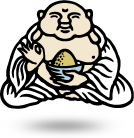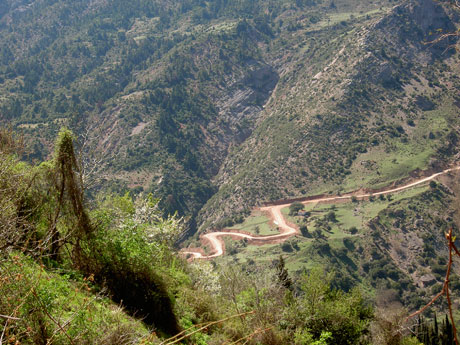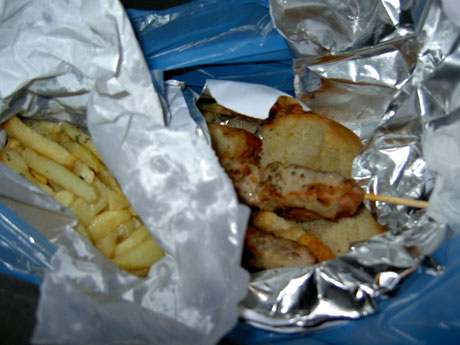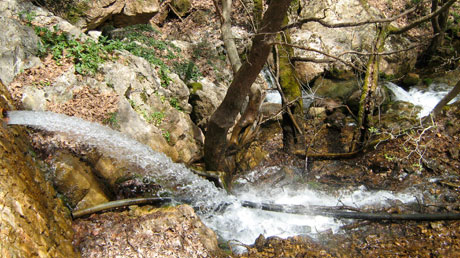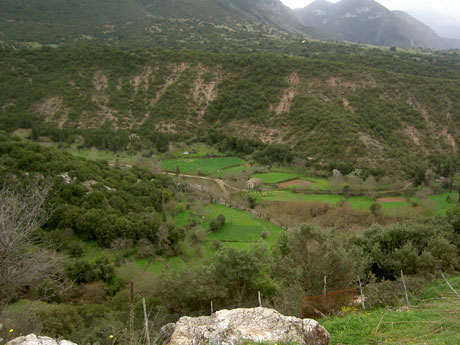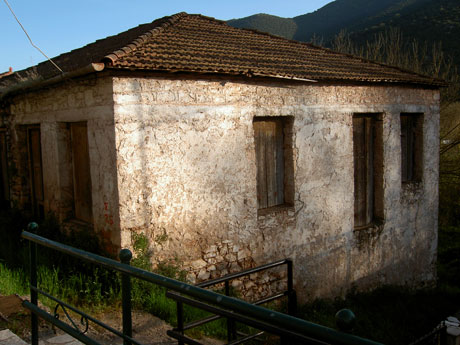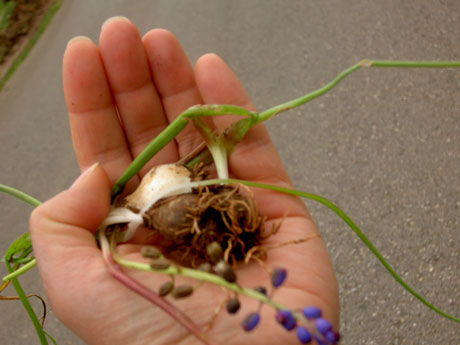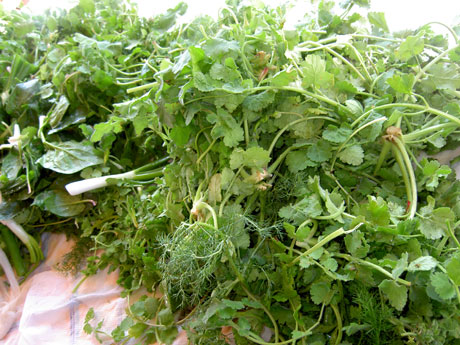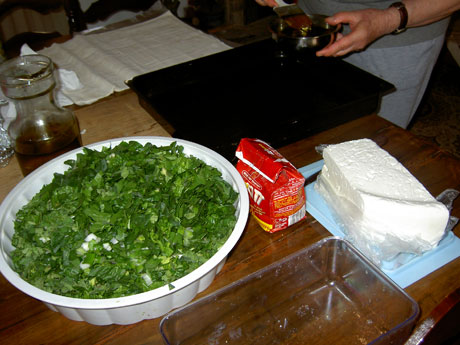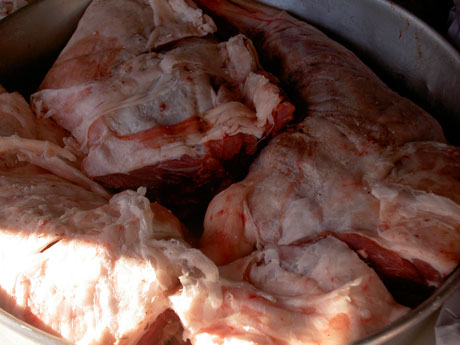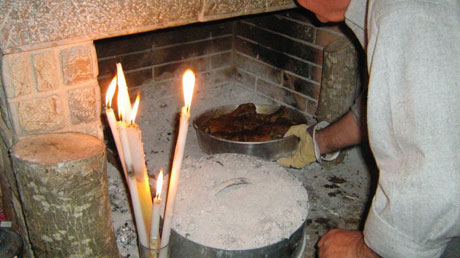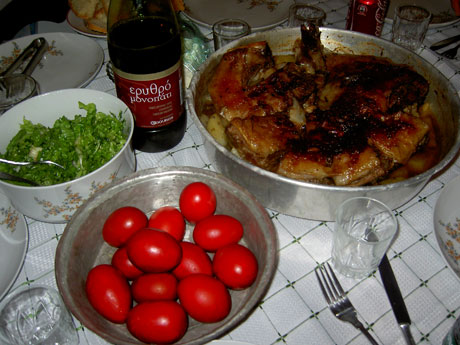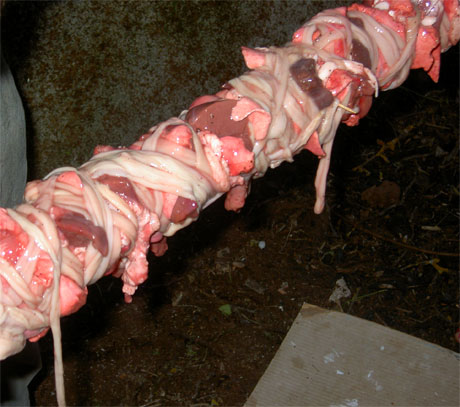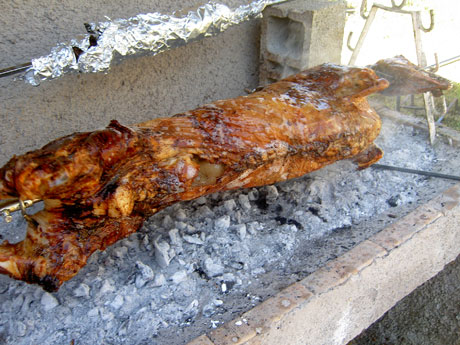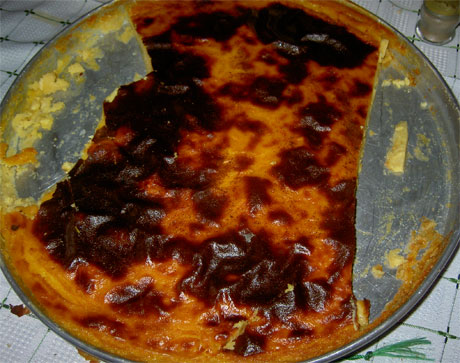Greek Easter, Village Style
Posted by Sylvia Rigakis on Monday, April 9th, 2012Tags for this Article: easter, Greece, lamb, offal, soup
Today is the first day of Greek Orthodox Holy Week, Great Monday, which culminates on Saturday at midnight with Easter and the breaking of a 40 day fast. The Greek Orthodox faith follows the Gregorian calendar which means Easter usually falls a week or two after “English” Easter. That’s always been awesome for me, double the food and your chocolate is half price!
For a few years now I have been wanting to go to my dad’s village in Greece to experience a traditional Easter. I convinced my non-Greek friend Alana that if she wanted a true Greek experience she should come with me. And once I said I we were going, my dad invited himself along for the trip, which ended up being kind of interesting, as for all the times I’ve been to Greece my dad and I have never spent any time together in his village.
On Great Thursday we drove with my cousin Sophie from Athens into the mountains of the north central Peleponese to Mazeika where our dads grew up. Not really following the fasting rules, upon arrival the first thing we did was stop at one of the local restaurants in the village square for a pig out to have the best souvlaki ever. Charbroiled over open coals and dripping with meaty goodness, it’s the best I ever tasted.
On Good Friday my dad and uncle drove us around the village and higher up into the mountains where they lived when the war was going on. Along with telling us stories about how they used to sneak away and go swimming while supposedly tending the goats, my dad kept wanting to stop and dig up wild bitter onions. In Greek he told us they were called vorvous. I’ve recently found out that you can find these here in the interior of BC and they are wild ramps. Along with the sight seeing we went around and bought local fresh eggs, cheese, bread and my favourite, Greek honey, which has a distinct flavour as it’s made from bees that drink from the flowers of evergreen trees.
Saturday morning my uncle lit the fireplace in the living room, put lamb and potatoes into one of my grandmother’s old pots and set it to roast in the coals all day. After church that night, our fast was broken at around 1 am, really it’s around 2 am, nothing like having a meat feast in the middle of the night! The meal consisted of a rustic garden pita (created from greens picked in the yard), salad, eggs, cheese, bread, wine and the lamb. After being in the fireplace all day, the meat so succulent that is fell right off the bone and all the juices from the lamb were infused into the potatoes.
As you can never have enough lamb, Sunday brought more to the table for the afternoon meal. This time my uncle roasted a whole lamb on the backyard spit over coals. Along with the lamb (with it’s super crispy mouth watering crackling) there was the traditional Easter kokoretsi. This is fairly easy to make, as it consists of the offal from the lamb strung onto a spit, tied on tightly with the intestine, then grilled over the coals. The only time consuming part is to make sure to thoroughly clean the intestine before proceeding to use it. Completely disgusting my dad (who hates offal) and Alana (sadly a vegetarian) this is one of the best ways I’ve eaten offal, simple, rustic and delicious. Which is also how I’d describe all of these meat preparations, they were spiced with only olive oil, salt, pepper, garlic and oregano. That’s all you needed to let the flavour come through. Finishing the meal we had another rustic pita, this time a sweet one made from sugar, milk and eggs.
Unfortunately we were only missing one of my favourite dishes, mageritsa, the traditional Greek Easter soup. As my dad is the offal hater he told my aunt not to make any. Not to disappoint me and being fellow foodies, my cousin Maria and her husband Kosta whipped some up when we got back to Athens. Again, it’s simple and rustic and consists of only lamb hearts, liver and kidneys, massive quantities of dill, green onion, a little rice and topped with a traditional egg lemon sauce. I have some lovely lamb offal from Cutter Ranch sitting in my freezer and you bet I’m making this next Sunday!
Upon reflection I have to say this was the best trip I’ve taken to Greece. Not only for the food but for whom I shared the food with, family that I don’t get to see very often.
Mageritsa – Greek Easter Soup
There are as many versions of this soup as there are Greek grandmothers. Here is the version my cousin made. Be aware there are not really any specific quantities or times for this – it’s kind of a soup experiment!
• 1 Lamb liver
• 1 Lamb heart
• 2 Lamb kidneys (my grandmother only used kidneys and heart, but in addition you can use liver as well as lung)
• 1 Bunch of green onions (with large bulbs or use a bunch of greens onions and one white onion)
• 2 T or more of dill
• Hot lamb stock or water
• 4 – 6 Tablespoons of rice
• 2 Lemons
• 2 – 3 Eggs
• Olive oil
• Salt, pepper
Boil the liver, heart and kidneys in hot water. Rinse. (My grandmother would boil the kidneys and rinse them at lease two to three times to remove impurities.) Remove any weird bits, skins or veins, let them cool and chop into bite size pieces.
In a large heavy pot heat olive oil, then throw in chopped onions, offal and dill. Let it all come to a boil, add the rice and enough hot lamb stock or water to cover. Simmer on low heat until meat is very tender which will take approximately three hours. Add more stock if needed, the soup should be chunky, not runny, but you will need enough broth to make the egg-lemon sauce – approximately three cups.
While the soup is simmering make the avgolemono (egg-lemon) sauce. Separate eggs and beat whites into stiff peaks, then beat in the yolks and lemon juice. Take a ladle full of the broth from hot soup and beat quickly into the eggs, repeat then pour this mix into the pot and serve hot.
